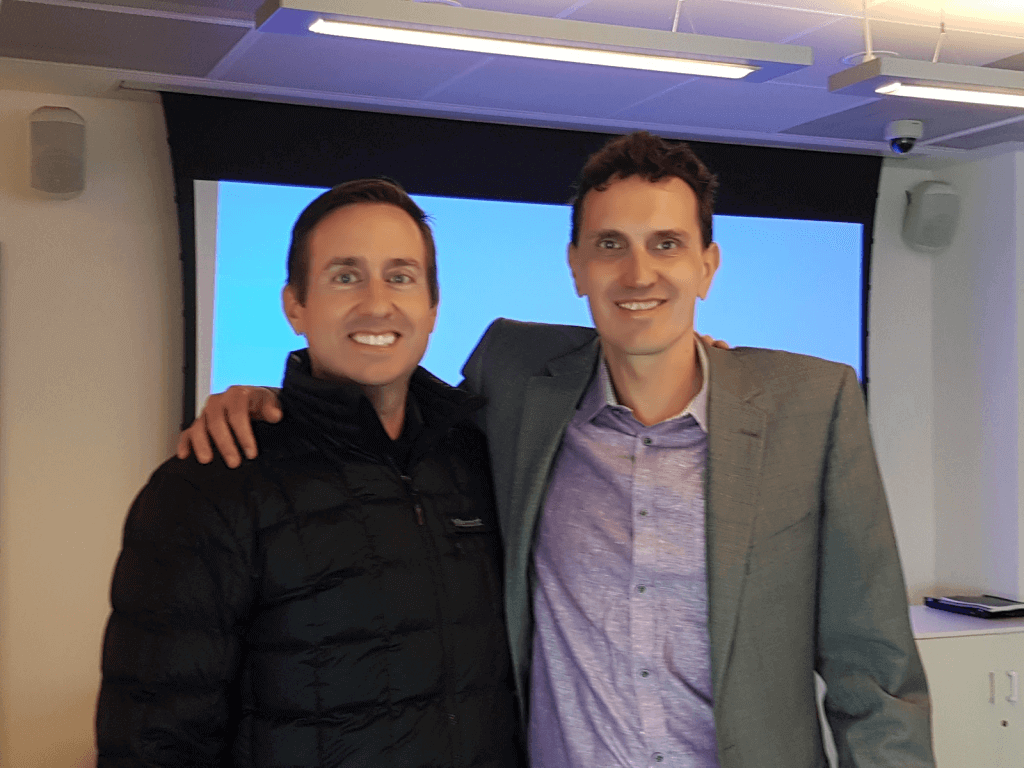A couple of weeks ago, I had the opportunity to go to London to attend two seminars on digital marketing hosted by Chris Raulf and Josh Steimle.
First of all, who are Chris Raulf and Josh Steimle?
Josh Steimle (on the left) is the founder of MWI, an international marketing agency. He has written over 300 articles for Forbes, TechCrunch and Entrepreneur, and other publications in the business world. His goal is to make you a thought leader, help you develop your personal branding and help you find the right leverage to attract talent and prospects.
Want to know more? Make the most of Josh’s expert advice by signing up for his next conference, by following him on LinkedIn and Twitter, or by visiting his personal website.
Chris Raulf (on the right) is the founder of Boulder SEO Marketing, a lecturer in digital marketing for the University of Strasbourg, and an expert in internationalized and multilingual SEO. His company offers SEO services and courses on all levels of digital marketing. His personal goal is to travel the world while teaching.
Would you like to benefit from Chris’s experience, be up to scratch with the latest SEO trends, or take one of his courses? Find Chris Raulf on LinkedIn and Twitter, visit his website, or read a previous interview with him on the TCLoc Master’s blog.
Top 3 digital marketing tips that stood out for me
Now that you know these digital marketing experts a little better, here are the top three points I hope you will take away from reading this article. Please note that these three points are equally important in my book.
1 – Keyword research is an essential element of optimized translation
The basis of any good SEO strategy is to start by ensuring the technical strength of a website and the user experience associated with it. However, in the context of the internationalization of a website, the cornerstone of SEO is effective keyword research. Indeed, within the same language there may be dialectical differences. It’s therefore very important to effectively determine the types of keyword Internet users will search for in the market you want to conquer.
For example, you are a French telecoms company and you want to sell your services in Canada and Switzerland. French is an official language in both these countries. However, it will still be necessary to localize terms depending on region, since Swiss Internet users will not use the French term “téléphone portable” when looking for a mobile phone, but will rather use “natel”, while Canadians will prefer “gsm”. If you don’t localize your site depending on the region you wish to target, your site will never appear on the results page of Internet users in that region.
It’s essential to localize a website even between two dialects of the same language. In fact, it’s even more important to have versions of your site in other languages, and therefore to optimize their translation as well. And there’s a real demand for these translation services. At the conferences I attended, 75% of visitors were localization professionals. Customers are increasingly asking language professionals to not only translate, but also to optimize translations for SEO. The success of an SEO optimized translation in a given country depends a lot on the keywords searched for by its Internet users. To be sure of the type of keywords internet users will search for, you have to have the right tools. So here are some of them: Rankwatch, SEMrush, or Moz.
2 – PR is useful in all areas of business
Often PR firms designate people responsible for the external communication of a company. But in the digital context, you can apply techniques used by these people to promote your company, or to target and prospect for new customers.
I didn’t know it at the time, but it’s common practice to contact journalists, influencers or online newspaper columnists to talk about your company. Well, it’s a little more subtle than that. For someone to agree to talk about you, or a subject that’s important to you, it is still necessary to approach that person in the right way, and to get him/her interested in your project. This strategic approach is also known as a pitch. And this is where prospecting and canvassing of journalists come together. The important thing is to choose your target well.
3 – Getting to know your target
This may seem obvious, but there’s no point in contacting journalists/contributors who won’t be interested in your talking about your topic. And how can you tell in advance? Well it’s simple, in every online magazines article, author’s names link to list of previous contributions. It’s all about targeting those who are already talking about the topic you want them to talk about. The goal here is to cut to the chase and save time.
But it doesn’t stop there, it’s not just about targeting the right person, it’s about making that person aware that you understand them. It’s much easier to make allies when you have a common cause. You need to find out more about the person, find common ground, and personalize the message when contacting him/her. Then he/she will understand that you are on the same side. Your target should have something to gain from this relationship, otherwise he/she will ignore you. This is totally normal, since no journalist has the time to carefully consider every request they get.
And the same goes for potential customers. Imagine you were working for a digital service company. So far you only have one recurring type of customer, let’s say SMEs (small and medium-sized enterprises) in the construction industry. It will be much easier for you to approach other construction companies by showing them what you can do for them, or other SMEs by showing them that you know about the issues they’re having. The point should not be showing off your skills, but pointing out your client’s potential blind spots and how you can help them.
Because you’re always someone else’s fool, the important thing is to know more than your neighbor. Yes, you can get hired without being the best in the world. Yes, you can start a business without considering yourself an expert. The most important thing is to know more than your customers! You have to be confident, work hard, and never stop learning. Tell yourself that as long as you have something to bring to the table, you have value!



